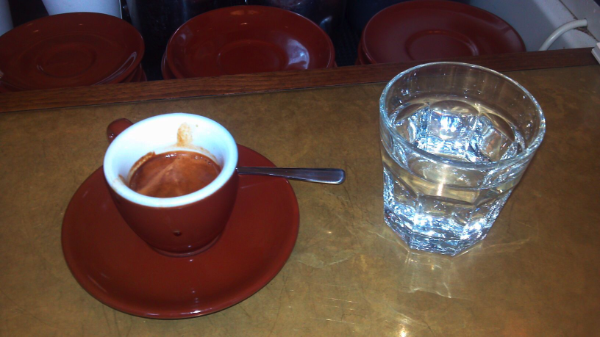For Stumptown Espresso Might Be Big Business
Post on: 17 Июнь, 2015 No Comment

A COFFEE fanatic in a vintage Pink Floyd T-shirt pulling shots of single-origin espresso from El Salvador on the latest-generation machine might not seem like a blue-chip investment.
But one private equity firm seems to think there’s a lot of money to be made from such specialized, high-end coffee.
TSG Consumer Partners. which buys stakes in brands like Terra Chips, Vitaminwater and Smart Balance to turn them around for a big profit, recently made a major investment in Stumptown Coffee Roasters of Portland, Ore. one of the most admired companies in the field, and has met with most of the top boutique coffee companies, including Blue Bottle Coffee, Counter Culture Coffee and Joe.
These companies are specks compared with a giant like Starbucks. But their loyal fans feel these cafes and coffee bars are to Starbucks what Starbucks is to the corner deli. They have raised the standards of excellence for each stage of the business.
Related Coverage
Stumptown’s New Investor Met With Other Top Coffee Companies JUNE 6, 2011
Stumptown Expands With the Help of a Powerful Investor JUNE 2, 2011
Companies like Stumptown have developed innovative and exhaustive systems for procuring some of the finest coffees in the world directly from farmers instead of brokers, improving the quality of the world’s best beans and of the coffee that’s available for sale. They’ve changed the standards for roasting to get the most nuanced flavors and meticulously determined how a shot of espresso should best be made.
Photo
Duane Sorenson, of Stumptown Coffee Roasters Credit Lui Kit Wong/Tacoma New Tribune, via Getty Images
Does this sound too elitist for the average American? Remember when the idea that millions of people would spend $5 for a latte seemed absurd?
Todd Carmichael, the founder of La Colombe Torrefaction in Philadelphia, said that TSG officials told him that they had bought 90 percent of Stumptown Coffee Roasters and wanted to expand in the specialty coffee businesses and eventually sell the businesses to a company like Nestlé, Coca-Cola or Starbucks.
Jeff Dreyfuss, who owns the Metropolis Coffee Company in Chicago with his son Tony, said a TSG official told him that the highly regarded roasters like his “had everything but were undercapitalized, and that his group had a lot of capital that they had to use quickly.”
According to Mr. Carmichael, Alexander S. Panos, the managing director of TSG who has been spearheading its specialty coffee push, said that the company had a $900 million fund.
Independent coffee companies could use some of that cash. The high-end coffee scene is expanding — it’s never been easier to find a beautifully crafted cappuccino made with small-batch beans and local milk.
But the costs of making a great cup of coffee have never been higher. The index price for high-quality Arabica commodity beans was 62 cents a pound in 2001; last year, it was $1.96 a pound; on Monday, it was $2.77. Beans for these high-end coffee bars can be $30 or more a pound.
Adam Craig, an owner of Culture Espresso Bar on West 38th Street, has raised coffee prices once since the shop opened in 2009. Customers noticed. “Somebody came in and ordered the ‘I’ll have the 25 cents more than yesterday’s coffee,’ ” he said.
At the same time, financing for expansion has tightened up.
“If you want to grow your business you have to do it somehow, and if you can’t get a loan, you have to sell equity, unless you have a really, really well-off grandpa,” said James Freeman, the owner of Blue Bottle Coffee in Oakland, Calif. He said he’d met with two representatives from TSG in March, but would not say what they discussed.
Neither Mr. Panos, of TSG, nor Duane Sorenson, Stumptown’s founder, would comment for this article. But in an interview last week about TSG’s investment in Stumptown, Mr. Sorenson said the investment would let Stumptown put even more into its coffees. “It’s really exciting because we have the resources to move forward and make great coffee,” Mr. Sorenson said. He said they planned to have two more coffee bars in Brooklyn, add a bottling facility there for cold-brew coffee and add roasters in Chicago, San Francisco and Los Angeles.
They were less forthcoming about long-term plans.
But some in the coffee industry warned that investors and roasters might not share the same goals.
“Any investment company is interested in return,” said Tim O’Connor, the president of the Specialty Coffee Association of America. “And that may not be where the coffee company’s greatest interest has been. There has always been that dynamic between the investment company wanting a return, and the coffee company wanting to do good in regards to the growers, the coffee and the customers.”
A version of this article appears in print on June 8, 2011, on page D2 of the New York edition with the headline: Not Just A Sip, The New Blue Chip. Order Reprints | Today’s Paper | Subscribe














